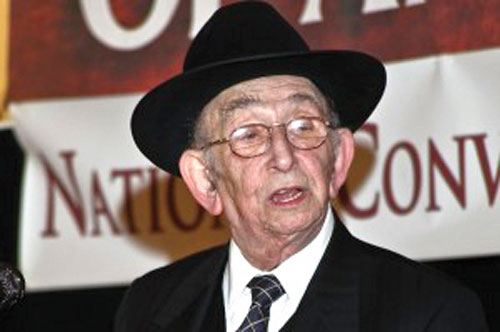.jpg) It is now just about 30 days, just a little more, since Yosl Friedenson, editor of Dos Yiddishe Vort, went to Olam Haboh. I knew Friedenson ever since I can remember. He and my mother were together in Ghetto Warsaw until she was smuggled out and taken to Munkacs, and eventually landed on the Kasztner train. When I began doing research on my mother’s story, and when I worked on The Goldberg Commission Report to examine the role of American Jewry in rescuing the Jews of Europe, my late father, Wolvie Friedman, told me to talk to three people: Yosl Friedenson, his colleague at the Agudath Israel—where my father was “World Vice-President” and Friedenson was Secretary General; David Kranzler, who wrote Thy Brothers’ Blood and the Orthodox Ends, UnOrthodox Means chapter of the Goldberg Commission Report (both about Orthodox rescue attempts), and Rabbi Moishe Kolodny, head of the Agudah archives.
It is now just about 30 days, just a little more, since Yosl Friedenson, editor of Dos Yiddishe Vort, went to Olam Haboh. I knew Friedenson ever since I can remember. He and my mother were together in Ghetto Warsaw until she was smuggled out and taken to Munkacs, and eventually landed on the Kasztner train. When I began doing research on my mother’s story, and when I worked on The Goldberg Commission Report to examine the role of American Jewry in rescuing the Jews of Europe, my late father, Wolvie Friedman, told me to talk to three people: Yosl Friedenson, his colleague at the Agudath Israel—where my father was “World Vice-President” and Friedenson was Secretary General; David Kranzler, who wrote Thy Brothers’ Blood and the Orthodox Ends, UnOrthodox Means chapter of the Goldberg Commission Report (both about Orthodox rescue attempts), and Rabbi Moishe Kolodny, head of the Agudah archives.
Friedenson hated being addressed by the title of rabbi and preferred to be called Friedenson. He was as unpretentious and tolerant as they come. You could go to him with the toughest questions. Two summers ago a woman approached me in Warsaw and said she needed to meet two people in New York to talk about spiritual resistance in Ghetto Warsaw. She would call me with their names when she got to New York. One of them was Friedenson, the other was Gutta Sternbuch, whose sister-in-law was a key negotiator in getting the Kasztner train out of Budapest and to safety. We went to see him at his apartment on the West Side, and he told us he believed in spiritual resistance and had organized shiyurim and davening, cheder and girls’ classes. But when he heard, after he left the ghetto, that his father was smuggling in arms, he was disappointed and felt the Jews had lowered themselves to the level of their enemies. It was an interesting evening, indeed.
Of course to meet with us, he had to put aside proof-reading and editing his beloved Dos Yiddishe Vort. Prof. Shneur Lieman, chairman of the Judaic Studies Department at Brooklyn College, said what Friedenson had compiled over the years since the war in those volumes was an accurate and moving history and chronicle of what Jewish life was like between the wars, during the Holocaust and in the post-war period. He said the magazines, which go back to 1945, when Friedenson started them up in the Displaced Persons’ Camps of Feldafing and Landsberg, are “A treasure chest filled with important stories about how Jews lived in every way of life, especially the Orthodox life.”
On a more personal note, Friedenson’s father, Gershon, was trapped with his family in Warsaw, but that didn’t stop him from saving my mother’s life. Gershon Friedenson designed the first Beis Yaakov curriculum for Sarah Schneirer and ran a vocational school in Lodz. Before my mother was smuggled out of the ghetto, he came to give her a farewell gift: letters of introduction to his students’ parents—people who lived in the countryside and hid my mother as she made her way to the Slovakian border.
Yosl also came by to say good bye and gave my mother a book of Yiddish poems he wrote to give her chizuk and emunah for her dangerous journey. Unfortunately, there came a time when my mother had to discard the book and other items that pointed to her Jewish identity. It broke her heart to do so, and she mentioned it during the week he was nifter.
Friedenson also let me have it over the head on more than one occasion—especially when it came to commemorating the Holocaust. He said our obsession with the Holocaust had replaced Yiddishkeit. His idea of victory was having a Siyumm Shas that filled Madison Square Garden and the restored Yeshiva Chachmei Lublin, where he was a student in his youth.
When I last saw him, he was recovering from a stroke, sitting as his dining room table, complaining as usual about deadlines. He slowly went over the seven point type, the teeny tiny letters that filled the pages of the magazine, concerned, as always, about current events, the state of the Jewish people and Torah Jewry, despairing of what he saw in the news. This was a man of action, a man who convinced Rav Schach to start the Shas party in order to get away from Ashkenazi discrimination of Sephardi boys in yeshivot. This was a man who said what he thought, and loved the Jewish people in its totality.
He was, like many of his generation, a voracious reader of EVERYTHING, including the New York Times and other secular publications. He knew his stuff. He was very much of this world, and bridged it to a rich and vital past we could easily forget, if not for him and Dos Yiddishe Vort.
By Jeanette Friedman










